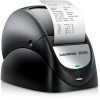Dymo LabelWriter SE450 Label Printer Technical Reference - Page 58
SYN Raster Mode Graphics - labelwriter label thermal printer
 |
View all Dymo LabelWriter SE450 Label Printer manuals
Add to My Manuals
Save this manual to your list of manuals |
Page 58 highlights
Command Reference Causes all the text that follows the command on the same line to be printed as doublewide characters. Double-wide characters are canceled by a line feed (CR or LF) or the DC4 command. Double wide is a character attribute and is available on a character-by-character basis. Double-wide text can be canceled at any point on the line. Double-wide text is automatically canceled at the end of the line. Therefore, subsequent lines will not be printed as double-wide text unless the SO command is re-issued at the beginning of each line. See Also DC4 Expression ASCII SO Decimal 14 Hex 0E Parameters None SYN Raster Mode Graphics Description Provided for LabelWriter raster compatibility. SYN is a synchronization character used to encode bitmap print data. The number of bytes in each string is controlled by the ESC D command. The starting position (left margin) is controlled by the ESC B command. The control electronics in the printer do not check the validity of the bitmap data. Therefore, it is the responsibility of the host software to send the correct number of data bytes for the width of the print head in use by the printer. The print head forms the image by heating a row of resistive elements that blacken the thermally sensitive label material. The resistive elements are 0.125 millimeters square (0.00492 inches) and are spaced at eight dots per millimeter (203.2 dots per inch) apart. The print head on the LabelWriter SE450 printer contains 448 elements. When a line is to be printed, the control electronics in the printer load the desired data into a serial shift register (the print head). The serial shift register has one location for each print element. A "1" in any given location causes the corresponding dot to be printed; a "0" leaves the dot un-printed. The most significant bit (bit 7) prints at the left margin. There is no command for clearing the shift register, therefore, the entire register must be loaded for each print line in order to flush out the old data. To reset the LabelWriter printer after a synchronization error or to recover from an unknown state, the host computer should send at least fifty-seven (57) ESC characters, followed by an A, to request the printer to return the status byte. A minimum of 57 ESC characters are 52















